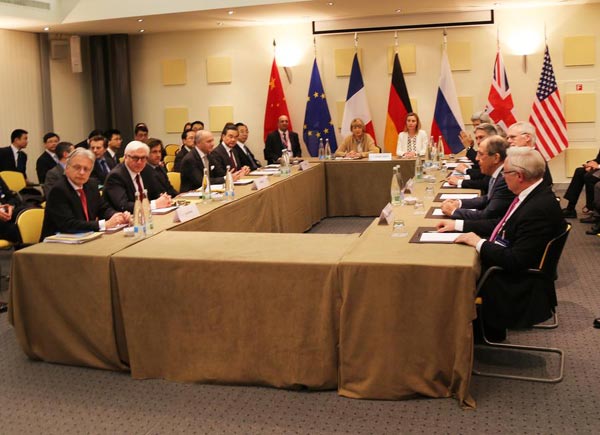

 |
| The general view of the plenary session on Iran's potential nuclear framework deal in Lausanne, Switzerland, on March 29, 2015. Foreign ministers from major world powers on Sunday night kicked off a plenary session to further bridge gaps on Iran's potential nuclear framework deal. [Photo/Xinhua] |
The new progress in the negotiations on the Iran nuclear issue has become a focus of the international community in recent days. A historic framework nuclear deal was reached on Thursday between Tehran and six major world powers, which lays a foundation for a comprehensive agreement on June 30, 2015. According to a joint statement of the Joint Comprehensive Plan of Action(JCPOA), all sides agreed that Iran's enrichment capacity, enrichment level and stockpile will be limited for specific duration, that the international community help Iran develop peaceful utilization of nuclear technology and that the U.S. and EU financial and economic sanctions and the UN Security Council resolutions on the Iran nuclear issue will be lifted, if Iran verifiably abides by its commitments .
The issue matters to the global non-proliferation, Iran's right to the peaceful use of nuclear energy as well as peace and stability in the Middle East, and even the world. It is important to reflect on how to seize the window of opportunities when looking back over the history of negotiations over the Iran nuclear issue.
The Iran nuclear issue, one of the major concerns in the international relations, has been under negotiations for 12 years. A welcome breakthrough was only possible under one critical condition that all sides seize the critical opportunity at the important point in history, have in mind the whole picture, insist on mutual respect and stick to the path of resolving the issue through equal dialogues and negotiations.
History shows that it is almost impossible to produce an acceptable result for all parties involved if they have not set aside their differences over technological details. It is important to make statements over the principles of negotiations in the critical moment of the negotiation. All the parties involved should adjust their ideas to the principles of the negotiation. During the negotiation, the Chinese delegates have repeatedly called for a peaceful resolution of the issue through diplomatic efforts and negotiations.
The Chinese side, an important party, has actively participated in the negotiation, put forward constructive proposals at many critical junctures of the talks, performed good offices by various means, collected the positive factors behind each party’s position and brought about constructive approaches since the Joint Plan of Action signed in Geneva in November 2013. The Chinese side puts forward a four-point proposal: First, political guidance should be upheld; Second, all parties should meet each other halfway; Third, a step-by-step and reciprocal process should be followed; Fourth, a package solution should be pursued. This proposal wins much attention from other parties involved. The Chinese side delivers on its commitments to coordinate with other parties and continues its constructive role in making a push for reaching a comprehensive agreement in time.
Negotiations need patience, confidence and sincerity in the face of age-old problems and new contradictions. The complicated negotiation on Iran nuclear issue involves many sectors and sees an increasing number of internal and external factors. All the parties involved should use creative thinking and seek common ground to resolve the remaining, inter-related problems in the issue.
The current stage can be likened to the last few meters before the finishing line of the long race for a comprehensive deal on Iran's nuclear issue. All the parties involved may encounter more difficulties as they come closer to the final deal. All the sides should cherish the outcomes they have made, create more favorable conditions, get rid of various interferences and secure the long-anticipated deal.
 J-11 fighters in air exercise
J-11 fighters in air exercise Beauties dancing on the rings
Beauties dancing on the rings Attendants-to-be join Mr. & Miss Campus Contest
Attendants-to-be join Mr. & Miss Campus Contest Beijing's toughest anti-smoking law takes effect
Beijing's toughest anti-smoking law takes effect Family lives in cave for about 50 years in SW China
Family lives in cave for about 50 years in SW China PLA soldiers operating vehicle-mounted guns in drill
PLA soldiers operating vehicle-mounted guns in drill Blind carpenter in E China's Jiangxi
Blind carpenter in E China's Jiangxi China hosts overseas disaster relief exercise for the first time
China hosts overseas disaster relief exercise for the first time 20 pairs of twins who will become flight attendants in Sichuan
20 pairs of twins who will become flight attendants in Sichuan Obama is sowing discontent in S.China Sea
Obama is sowing discontent in S.China Sea Rescuers work through night to reach cruise ship survivors
Rescuers work through night to reach cruise ship survivors Driving through limbo
Driving through limbo Facing down MERS
Facing down MERSDay|Week